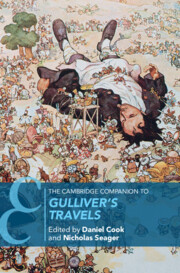Book contents
- The Cambridge Companion to Gulliver’s Travels
- The Cambridge Companion to Gulliver’s Travels
- Copyright page
- Contents
- Figures
- Notes on Contributors
- Abbreviations
- Note on the Text
- Chronology
- Introduction
- Part I Contexts
- Chapter 1 Politics
- Chapter 2 Religion
- Chapter 3 Bodies and Gender
- Chapter 4 Science, Empire, and Observation
- Part II Genres
- Part III Reading Gulliver’s Travels
- Part IV Afterlives
- Further Reading
- Index
- Cambridge Companions to Literature
Chapter 4 - Science, Empire, and Observation
from Part I - Contexts
Published online by Cambridge University Press: 05 October 2023
- The Cambridge Companion to Gulliver’s Travels
- The Cambridge Companion to Gulliver’s Travels
- Copyright page
- Contents
- Figures
- Notes on Contributors
- Abbreviations
- Note on the Text
- Chronology
- Introduction
- Part I Contexts
- Chapter 1 Politics
- Chapter 2 Religion
- Chapter 3 Bodies and Gender
- Chapter 4 Science, Empire, and Observation
- Part II Genres
- Part III Reading Gulliver’s Travels
- Part IV Afterlives
- Further Reading
- Index
- Cambridge Companions to Literature
Summary
“In the early eighteenth century, Britain sought to establish itself as the centre of a global knowledge network and, as part of its imperial ambitions, all of nature was subjected to scientific scrutiny and potential control. Swift’s protagonist Lemuel Gulliver recognises his potential as a broker of knowledge within numerous transnational, transcultural, and trans-species encounters, padding his empirical, observational prose with enumeration and comparison in order to convey information about supposedly faraway lands and peoples. Swift’s vignettes of interspecies or intercultural viewing ironise the colonial contact zone, revealing the partiality, contingency, and relative value of British and European scientific knowledge, and, ultimately, undermining notions of national or racial superiority upon which visions of empire rest. Gulliver’s Travels is itself a remarkable encounter, between literature and science, and the parameters of that engagement are partly defined by the colonial project, with the seemingly objective activity of observation implicated in imperial tyranny and exploitation. In scientific observation, Swift found a discursive mode around which he could structure an entire prose satire whilst also probing its intellectual and moral limits, placing the process of observation itself under satiric scrutiny.”
Keywords
- Type
- Chapter
- Information
- The Cambridge Companion to Gulliver's Travels , pp. 46 - 58Publisher: Cambridge University PressPrint publication year: 2023

